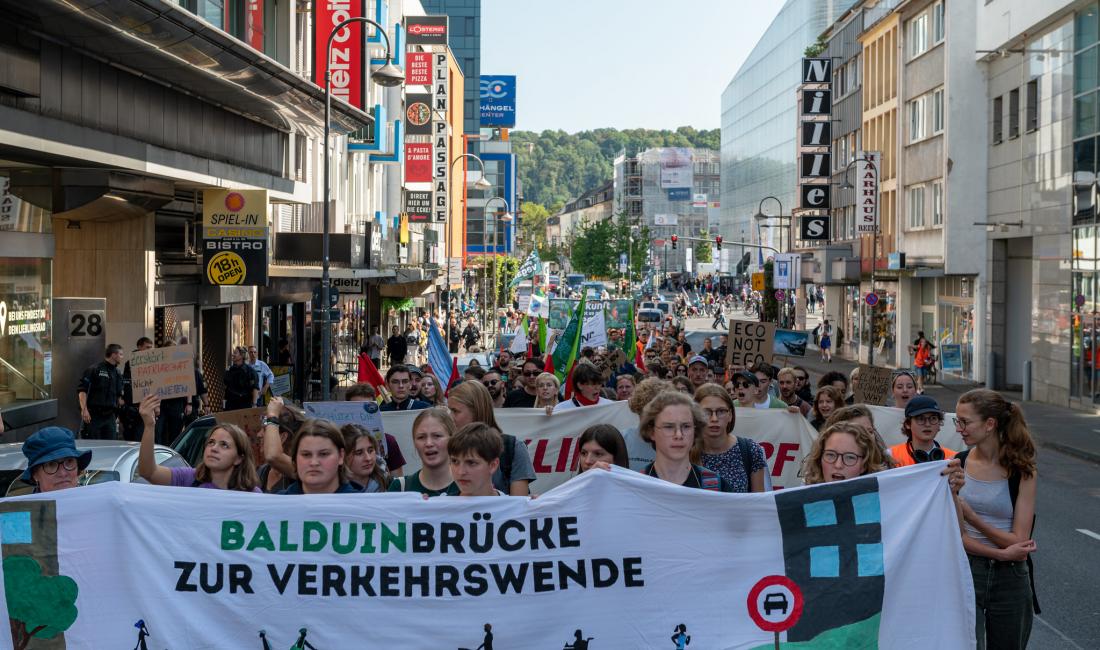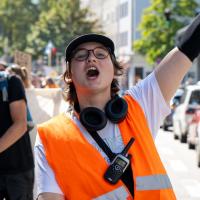At Democracy International's Democracy Camp in Koblenz, we had the privilege of being hosted by Fridays for Future organiser and Climate Activist Luca Braun. After a long day of demonstrations which over 500 people joined, Luca was still eager to host us to discuss the importance of climate action and hear first-hand about the work of the Friday’s for Future Chapter in Koblenz. The following statement was delivered by him.
Democracy International is not responsible for the content of the speech and the opinions shared in the speech may differ from the position of Democracy International.
Buenos Dias, Salam aleikum and welcome here. My name is Luca, I am 16 years old, my pronouns are they and he and I am a part of the orga team of Fridays for Future Koblenz. I am here to tell you a bit about what we are doing here today. Therefore, I was given two questions I want to answer after an introduction of Fridays for Future globally and in this City. Afterwards, I’d like to talk about mental health and activism.
First of all: Fridays for Future is a global movement by and for young people, initiated by the Swedish Greta Thunberg. We want to make people aware of the global warming of the planet, how people are destroying it through emissions on the streets and in the factories, plastic in the oceans and deforestation, such as the Amazon but also elsewhere in the world. Today, people are already drowning in the floods, having to leave their homes and flee. The problem: people who are affected by climate change today are mostly poor. They cannot protect themselves, and they themselves are not responsible for their suffering. Climate justice is therefore also a core issue. However, people are affected by climate change not only in the global south but also here in Germany. We demand from the government not only that it protects people worldwide from the climate catastrophe but also here in Germany. For example, the flood in the Ahr valley has shaken us up. One of the main problems is the sealing of surfaces so that the water cannot drain away. Not only ecological bullshit but also deadly in this case. The people have to realise that our civilisation is endangered today!
Now a few words to what is going on in our city. Koblenz has declared a climate emergency in 2019 which we fought for and which we saw and has set itself plenty of goals. Yet nothing has really happened not even the interim goals are met. For example, healthy trees are now being cut down in the street Südallee to create a more uniform cityscape. With the road now planned, neither climate protection nor climate adaptation can be seen. The Herlet garden, an oasis in the middle of the city, is to give way to a building. We try to prevent a felling in the cold air corridor of the Mühlental, which would lead to a warming of this. We continue to demand that Koblenz becomes climate neutral by 2035 and that we participate in the heat planning. For this we have in Koblenz the so-called Klimabündnis, the climate alliance, in which about 30 organizations from Koblenz engage themselves in the climatic and environmental protection by organizing demonstrations, but also clean ups. We wrote an open letter to the Mayor of Koblenz, we support each other. It's a very good feeling to have so many people taking care of eachother especially as our fff group in Koblenz is really small with about four people.
Now i want to answer the questions i was given.
What potential do we see in the climate protests?
With our protest, we want to make people aware. On one hand we try to make the climate emergency an as big issue in people’s heads as it is for our globe. On the other side, we need to show the power of the people and how many are united in our fight to our leaders. They are who we voted to act for us! We really believe in what we are doing. We wouldn’t put so much affort in these protests if we didn’t. I look hopeful towards the future! We want to make this work, we need to and we will.
Which other participation possibilities do we use?
For this question, I will simply talk from my perspective. I am active in school in multiple extracurriculars to make school a safer place for everyone. For example, I organized a workshop last term, not about our planet but about different forms of discrimination in school. With that, sadly, came a huge backlash with people throwing wet paper balls at me and screaming “You should be ashamed” into our room among other things. That didn’t stop our group from finishing a report for our head teachers and the queer representative of the city. Never back up never what? Never give up! Additionally, I am in the youth organization of the party DIE LINKE called Linksjugend [‘solid], active on social media and I try to live as climate-neutral as possible. No animal products, no planes, avoiding waste. I talk about the ecological problems we are facing whatever chance i’m given. Activism for means to get up and out of my room!
And now comes the part about mental health. I’ll be talking about self-harm, depression, hospitalization and burnout. If you are not okay with these topics, skip the next paragraph. If you need any help, please reach out! Remember you are loved and cared about. Our movement is all about a future for everyone. Why should that exclude you?
I am mentally ill, it’s visible on my body and I am aware of that. I was diagnosed with severe depressions after a suicide attempt, followed by ptsd and dissociative disorder after a longer stay in a day clinic. I organized the climate protest in march from inside another hospital. It helped me to stay strong, I had something to get up for in the morning. But: The way I treated myself as a servant for my projects instead of an individual person brought me close to a burn out multiple times. I had to learn the importance of breaks, taking time for myself and therapy, the hard way. Because: Activism doesn’t work if you are burned out. The projects are nothing without the people behind it. I need to take care of myself, set boundaries. I really want you to remember that you are important as yourself, not only what you do.
To finish up I have some questions for you to think about: What can you do to be a part of the climate movement? Where can you help and where can you make your life more climate neutral? What do you love about this planet that makes it worth saving? Thank you so much for reading.




